#Mobile App Development Company in Zambia
Text
#Software Development company in India#custom software development company in india#Graphic design company in India#App Development Company in India#Mobile App Development Company in India#Ecommerce website development company in India#Digital marketing Agency in India#digital marketing company in india#digital marketing services in india#Web Hosting Services in India#linux hosting service provider in india#Graphic design company in Zambia#Software Development company in Zambia#Mobile App Development Company in Zambia#Ecommerce website development company in Zambia#Digital marketing Agency in Zambia#Web Hosting Services in Zambia#App Development Company in Zambia#Software Development company in USA#Graphic design company in USA#Mobile App Development Company in USA#Ecommerce website development company in USA#Digital marketing Agency in USA#Web Hosting Services in USA#App Development Company in USA
0 notes
Text
How can custom web applications boost business efficiency?
In today's digital age, having a strong online presence is crucial for businesses of all sizes. The internet offers a vast landscape for reaching potential customers, communicating with existing ones, and conducting various business operations. To leverage this potential to the fullest, businesses often seek to create their unique identity through custom web development.
Custom web development is the process of building websites or web applications tailored specifically to a business's needs and goals. Unlike off-the-shelf solutions or ready-made website templates, custom web development allows businesses to have full control over the design, features, and functionality of their online platforms.
Here's a comprehensive look at how custom web development can significantly boost business efficiency and success:
Unique Brand Identity: A customized website provides the perfect platform for showcasing a business's real brand identity. By tailoring every aspect of the website to align with the brand's values and personality, businesses can create a distinctive and memorable user experience.
Purposeful Web Applications: Custom web application development focuses on creating powerful, scalable, and secure online applications that cater to specific business needs. These web apps go beyond standard websites and offer interactive and dynamic features like user accounts, databases, e-commerce systems, and intricate business processes.
Improved Communication and Customer Engagement: Web applications enable businesses to communicate more effectively with their consumers. Real-time feedback features allow businesses to uncover patterns and address customer issues promptly, leading to improved customer engagement and satisfaction.
Streamlined Processes and Increased Efficiency: Custom web applications streamline business operations by centralizing data and eliminating the need for multiple spreadsheets and manual tasks. This improves efficiency, reduces errors, and saves valuable time.
Personalized User Experience: A well-designed user interface enhances the overall user experience. By understanding their target audience and incorporating seamless cross-browser and cross-device compatibility, businesses can offer a user-friendly website that compels visitors to explore further.
Scalability and Flexibility: Custom web applications can be designed to accommodate growth and changing demands. They can handle a high number of concurrent users without experiencing outages or performance issues, ensuring a satisfying experience for customers.
Enhanced Data Management and Analysis: Web applications equipped with powerful analytics and reporting features enable businesses to make data-driven decisions. Dashboards and indicators help assess performance and plan future strategies more effectively.
Increased Security and Data Protection: Security is a top concern for businesses dealing with sensitive customer information. Custom web applications can be built with advanced security measures, ensuring data protection and building trust with customers.
Competitive Advantage: Having a unique and tailored web application can provide a competitive edge. Offering superior products or services, implementing innovative technologies, and providing exceptional customer experiences contribute to outperforming competitors.
Cost Optimization: Although custom web development may require a higher upfront investment, it can lead to long-term cost savings. Businesses avoid paying for unnecessary features and can adapt the application to meet evolving needs, reducing future expenses.
Challenges of Custom Web Development Solutions:
Despite the numerous benefits, custom web development also presents some challenges:
Clear Requirements: Expressing precise requirements to the development team is essential to avoid misunderstandings and delays in the development process.
Time and Cost: Custom web development may require more time and resources compared to using ready-made templates. Businesses need to consider the trade-off between customization and speed of deployment.
Integration: Integrating a new web application with existing systems can be complex, especially if compatibility issues arise. Proper planning and skilled development are necessary for a seamless integration process.
Expertise: Custom web development requires a skilled and experienced team to ensure the success of the project. Choosing the right development partner is crucial for delivering a high-quality product.
Conclusion
Custom web development plays a pivotal role in empowering businesses to achieve their goals, engage customers effectively, and streamline operations. It enables businesses to create a unique brand identity, develop purposeful web applications, and stay ahead of the competition. With personalized user experiences, scalability, and enhanced data management, businesses can optimize their processes and make data-driven decisions.
However, businesses must be aware of the challenges involved in custom web development and invest in the right expertise and resources to ensure success. By embracing the potential of custom web development and choosing the right development partner, businesses can unlock new opportunities and thrive in the digital landscape.
#software development company#mobile app development#web app development#digital marketing#graphic design#e commerce software development services#usa#zambia#india#custom software development#business services
0 notes
Text
Celebrating Black History Month: Fonta Gilliam

This Black History Month, NYTA recognizes and celebrates the many incredible black men, women and non-binary individuals who have graced our stage at NY Tech Meetups to present and demo transformative tech; shared subject matter expertise during Forum events to provide perspective and participated in Founder Spotlights to tell their story and inspire other founders as they pursue their own journey of building a business. As part of our celebration, this week we recognize and celebrate Fonta Gilliam, CEO and Co-Founder of Wellthi, a fintech company based in Washington, DC and a part of the NYTA community.
About Fonta Gilliam
Ms. Gilliam has over 10 years of development finance experience working in the United States, Africa, and Asia as a U.S. Diplomat and a management consultant in Deloitte’s Emerging Markets Practice.
Over the course of her career, she led numerous White House and U.S. State Department initiatives, including launching two of the U.S. Government’s first women’s business centers in Africa and designing innovative financing facilities to unlock capital for women and small businesses in the United States, Kenya, Morocco, Zambia, Nigeria, South Korea, and China.
In 2016, she was awarded the U.S. State Department’s prestigious Franklin Award for her tireless work to support economic empowerment and financial inclusion initiatives in Africa.
Ms. Gilliam has a Master of Arts in economic development from American University’s School of International Studies (SIS) and a Bachelor of Arts in political science and economics from Howard University.
About Welthi
Welthi is redefining the mobile banking experience for the next generation, empowering customers to achieve their financial goals with engaging social features and positive group think. They have been recognized for over a half dozen awards for their innovative technology, and they’re just getting started!
Several ways you can recognize and help Fonta and her team:
Visit their website and learn about the Wellthiapp
Download and use the app
Refer Wellthi to family and friends
Watch and listen to Fonta’s story on NYTA’s YouTube Channel
0 notes
Photo
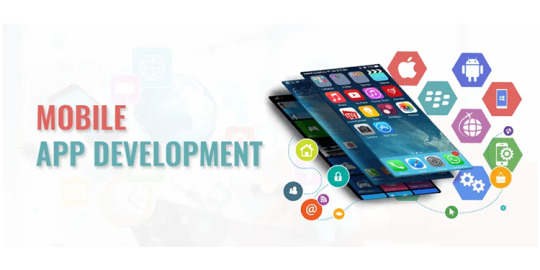
One Word: Mobile App Development Company in Zambia
A network connection is typically used by a mobile application to communicate with external computing resources. Mobile application development is the process of developing software applications for portable electronic devices. As a result, creating installable software packages, setting up backend services like data access through an API, and testing the application on the specified target devices are all part of the mobile development process.
Types of mobile apps
· Native Applications: Integrated Development Environments and Languages for Mobile Operating systems like Apple iOS or Google Android are used to create these applications. Although you can personalize essential features with native apps, they can be more expensive than alternative technologies.
· Hybrid apps: These Web applications function much like native ones. Technologies like HTML, JavaScript, and Cascading Style Sheets are used to create them. Hybrid apps can be developed more quickly and more affordably than native apps, but they lack the same feature-richness.
· Progressive Web Apps: A PWA is a website that has the appearance and functionality of a mobile app. These programs were created using Web technologies like Facebook React.
· Encapsulated apps: Running inside of a container app is an encapsulated app. Less experienced developers can quickly create a mobile application with tools like the Microsoft Power App drag-and-drop app creation tool. However, issues could arise due to OS lock-in, lack of isolation from the core OS, and relative youth.
· Frameworks and libraries: You can hasten the creation of a mobile app by using this reuseable code created by someone else.
Mobile App Frontend Development
Your customers will view the mobile app's front end. Mobile frontend development makes use of a wide range of various technologies. Some programs require backends and APIs, while others only require the platform's built-in databases.
Almost any Web programming language can be used to develop the backend of your mobile application. While developing native applications, you can make use of technology-specific resources.
Each programming language offers a unique set of features, depending on the platform you use. You should be able to choose a team that is educated about which key technologies may be employed most effectively by choosing the best programming language.
Mobile App Backend Development
The backend of your mobile app functions very differently from the front end, which is how it generally works. You may think of the backend as an additional application. It is software that operates on distant computers known as servers. It is accessible via API on the Internet. The backend is intended to be utilized by other programs and not by people directly. Its function is to carry out remote operations that, for a variety of reasons, the frontend apps are unable to carry out.
Frontend vs. backend
Frontend development focuses on the visual components of software, websites, and mobile apps while also designing and creating applications. An end user engages with this portion of the software solution.
A typical end-user might never see or utilize the server side of software, a website, or a mobile app because backend development is concentrated on that side of the application. In the form of data, verification, authentication, security, and other services, the backend offers crucial support.
Any app's success and functionality depend on its frontend and backend. They collaborate flawlessly to create a dynamic mobile app and enable users to do their tasks.
Android App Development
A mobile, multitasking operating system is utilized in TVs, readers, consoles, smartphones, tablets, and even home robots. Android Inc. created the Linux-based operating system, which Google later bought and popularized. Modern smartphones and tablets can be thought of as pocket mini-computers because of this operating system.
Less than an hour is sufficient for getting to know Android, which is a very flexible and user-friendly system. Due to the abundance of pertinent programs, any user can simply configure OS settings. The appearance, icons, or ringtone may all be changed beyond recognition; simply visit the Google Play Store, download the appropriate software, and rapidly customize everything to your preferences.
IOS app development
The process of creating mobile applications for Apple products, such as the iPhone, iPad, and iPod Touch, is known as iOS application development. Swift or Objective-C are used to create the software, which is then posted to the App Store for people to download.
You might be wary about developing iOS apps if you work as a mobile app developer. For instance, a Mac computer is a must for developers and is typically more expensive than Windows-based PCs. Your software must also pass a rigorous quality assessment procedure after it has finished development before being made available through the App Store.
Windows App Development
The majority of desktop software is native, meaning it was created specifically for a given operating system. To name a few more well-known frameworks, programmers can also create cross-platform desktop applications by utilizing desktop development tools. Once more, creating mobile apps is comparable to this.
Desktop applications must be downloaded to your computer in order to function because they don't need an Internet connection. Additionally, desktop programs can get at the device drivers on your computer. You might not be aware that the device's drivers can only be accessed by software that has been downloaded to your computer. For instance, the only reason you can play sound from a web app is if it is running on your preferred desktop browser.
Conclusion
The topic of developing mobile apps is complex. The user experience must always come first when developing apps, whether they are cross-platform or native. Your app's functionality must match its primary use case, and the interactive components must be easy to use.
0 notes
Text
The best 5 Mobile apps development companies in Accra, Ghana

According to the latest survey, there is a 27% growth in the amount of common digital users and more than 60% of people use applications for their own business. These companies give the total growth of Android, iOS and Windows Apps. Companies hire dedicated application developers to meet the demands and requirements of their customers. Many companies are headquartered in Accra and other regions. The development team is also trained in web development and recruiting the best mobile apps development companies in Ghana.
The current demand is strong due to the number of top Android app development companies in Ghana among which a few companies rank first in the country's list of mobile application development companies and offer a wide range of models adapted to the latest trends. The city of Kumasi is growing in the 21st century with the increasing use of mobile phones. Factors such as e-money and government policies have taken Ghana out of the grassroots and presented it at the best of the mobile program development indicator.
Tops Mobile Apps development companies in Ghana:
1. Fusion Informatics-Best Mobile App Development Company in Ghana
Fusion Informatics is one of the most famous mobile application development companies in Ghana. Accra, Kumasi, Tamale, Sunyani, and Sekondi-Takoradi offer different strategies in the method of developing applications for various industries. We believe in quality, which adds to business growth at the next level. We understand that experts are able to meet quality standards to develop an award-winning mobile app for your business.
As the leading mobile application developers in Ghana, we always refresh ourselves with the latest technologies and develop a user-friendly design that gives room for growth for our customers. As the first and best app development company in Ghana, we have previously made more than 1500 applications in several areas.
2.21Twelve Interactive:
21Twelve Interactive offers a wide range of services, from advising and design to engineering, as well as general support for identity management in mobile application development services. They have begun offering customized solutions for Android and iOS applications, but they are now with the leading mobile app development companies in Ghana, offering natural and reliable mobile application development. His team of experts has excellent skills and the general knowledge required to create a highly functional and personalized mobile application. They complete all their projects well on time, without error or fault.
3. Makedu Consult:
Makedu Consult Limited has expertise in Information Technology solutions. Makedu has built a name in software development covering a wide-range of programming languages and databases. Makedu end products comprise desktop, web-based and mobile applications for governmental, multinational, international development partners and the private sector. As an IT partner, Makedu strength lies in perceiving the client’s business processes, culture, image and goals across the industry segments and offering client oriented solutions, which are highly secure.
4. Adaptive Computer Solutions Ghana Limited:
We are a software development and consulting company that provides cutting-edge engineering solutions, helping businesses and very entrepreneurial customers solve the complex problems that arise during their digital evolution journey. Since 2014, we are a reliable partner in software engineering producing leading brands.
5. CreativeBibini:
Creative Bibini is a technology company based in Accra, Ghana that develops mobile and web applications to create a user-friendly and interactive experience for customers and users using custom systems developed by CB Team, a team of young creative technology entrepreneurs and passionate. Whenever feasible, we try to solve Continental's problems using software that makes life easier and increases productivity.
Conclusion:
We hope to have given the necessary explanation regarding the hiring of the leading mobile apps development companies in Ghana. According to our research, we have designed this list of the most known companies in Ghana, particularly in the mobile application development market. Choosing the right application development company requires an individual approach and does not significantly require working with companies. Hire the largest mobile application development agency for the development of your mobile application. You may get in touch with us at Best mobile apps Development Companies in Nigeria for a free quote to develop a mobile app for your business. And helps Business owners to reach more customers who want to change their business towards app development, The Company has a very good working environment. To know more about my company, Visit Fusion Informatics. For more queries please send a mail to get a free quote [email protected].
For more details visit:
Mobile App Development Company in South Africa
Mobile Apps Development Company in Uganda
Mobile App Development Companies in Kenya
Mobile App Development Company in Nigeria
#Android Apps Development Companies in Zambia#Mobile App Development Company in Zambia#Android App Development Company in Nigeria#Mobile App Development Company in Nigeria#Android App Development Company in Tanzania#Mobile Apps DevelopmenT Companies in Tanzania#Android App Development Company in Ghana#Mobile App Development Company in Ghana#Android App Development Company in kenya#Apps Development Company in Kenya#Best Android App Development Companies in Uganda#Mobile App Development Companies In uganda#Best Android App Development Companies In south africa#Apps Development Companiesin South Africa#Android Application Development Companies In Ethiopia#Apps Development Company In Ethiopia
0 notes
Photo
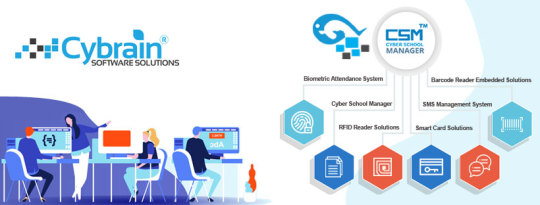
Digital marketing services in Zambia | Cybrain Software Solutions Zambia Limited
Cybrain Zambia empowers your online presence with web design & development. For us, it is long term success of your business website that matters.
Contact Us
Registered Place: Bytes Park Plot 21914/M, Ngwerere Road, Lusaka.
Tel : +260 962 646393, Mobile : +260966834868
Email : [email protected]
http://bit.ly/2sp8HM4
#Digital Marketing Company Zambia#Web Development Company Zambia#Mobile Apps Development Company#software development company Zambia#Web Design Company Zambia#digital marketing services in Zambia#online school software in Zambia#School management software Zambia#mobile app development services Zambia#club management software Zambia#healthcare software companies Zambia#Best School management App Zambia#SMS Management Software Zambia#SEO Company in Zambia
1 note
·
View note
Text
How to close the skills gap in Africa
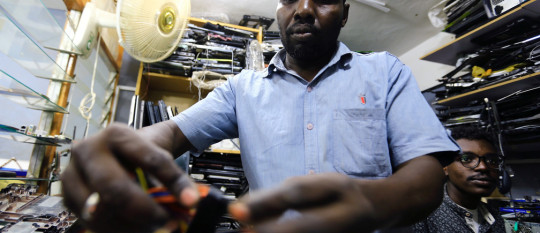
Demographic Development versus Educational Needs in Africa
Not a fun fact: There are 128 million school-aged children in sub-Sahara Africa; of these, 17 million children will never see a school.
Here’s another: 37 million African children do go to school, but what they learn will never hold them in good stead. So it’s as well that they don’t go to school at all.
Crippled by poverty, overpopulation, linguistic hurdles, and lackadaisical governments, sub-Sahara Africa students find it hard to obtain the level of education they want. If you are a student, teacher or educational professional in Africa – you should know that online courses - mobile learning (m-learning) and e-learning is the way to pave Africa’s future.
There are many reasons to promote EdTech – the topic of the distance-education-guide-africa.com.
Access To Education In Africa

Steady access to education in Africa depends on several factors, as follows:
• Location of the school – this depends on various factors. Some areas of Africa are densely populated, while others are not. There is an effort to start more schools in densely populated areas, but these are little more than sheds. Then again, in lesser developed and lesser populated areas, schools are few in between.
• Aspects such as how many schools are available per region, and what distance must children travel to get to school must be considered. Children are forced to travel long distances to get to school, and the resulting transport and safety issues are many.
• There’s also the cost of schooling. How many parents can afford to send their children to school, paying hard-earned cash for supplies and so on?
• Parent’s attitude towards schooling – not all parents are cognizant of the need for schooling for their children, or its importance. This socio-cultural issue stands at the root of children being pulled out of school.
More than 40 percent of children in seven sub-Sahara Africa countries – including Nigeria, Zambia, and Ethiopia – don’t have the basic learning skills expected of a grade 5 student. Dropping out of school at secondary and even primary level is rampant. Half of the children in sub-Sahara Africa will grow up without knowing how to read, write, or count.
How Effective is the Present Educational System in Africa?
Even in regions comprising more educational institutions than usual, the enrolment and progress statistics are not encouraging. Owing to the lack of quality teaching and consistency of teaching resources, there’s a great deal of grade repetition. As a result, the number of children who successfully complete primary grades are few, which means primary schools are fuller than secondary schools.
Speaking of teaching staff, the senior staff is paid more than inexperienced ones, as it should be. However, this means that in schools where most of the staff are older, the salary figures are high. This causes schools to hire younger staff and retire the older ones sooner than necessary. All of these factors affect the quality of education provided in these schools. Given all these factors, the present educational system in Africa is not very effective, in terms of helping young people to develop and progress into careers.
How Affordable is Education in Africa?
Even though some government-sponsored schools are free, students in many African countries have to pay for school supplies and uniforms. An average high-school education costs about $500 a year in most African countries.
Only those Africans who are employed in top industries (mining, agriculture, and oil & gas) are able to afford schooling for their children.
That’s the gap where e-learning providers can enter the market and bring affordable access to education to many more of the unschooled children.
By the way: two recent fintech startups submitted news heading towards the same direction. WorldRemit, well established mobile money app, stated that 40% of the remittances sent on the WorldRemit app are targeted to pay the tuition fee of family members.
And Paxful, the leading peer-to-peer bitcoin marketplace, announced that it will build the third African school financed by bitcoin earnings.
Linguistic Hurdles in the Path of Education
The medium of instruction is another reason for mass school dropouts. Children have to travel considerable distances to get to school; given sub-Sahara Africa’s cultural diversity, there’s always a dialect or language mismatch. It’s difficult for children to study in a language other than their own.
This can be a high fence for classical education tools based on printouts and face-to-face lessons. For edtech based lessons with software the linguistic hurdled can be decreased with the help of translation programs, already installed in the eLearning products.
Is E-Learning the Solution Africa Needs Today?
E-learning bridges several gaps – cultural, geographical, demographical, and economical. Anyone can join online courses, no matter what their age. Massive Open Online Courses (MOOC) are free online courses for those with access to the Internet. These courses do not offer academic credit, though they are the same as university courses. The African Virtual University (AVU) connects students with universities in developed countries to provide MOOC edtech. There are many other organizations offering excellent MOOC edtech programs.
There are online courses even for those African students who’ve only cleared primary or secondary level schooling. Schools and universities use special MOOC software to teach, and keep in touch with their students via video tools such as Skype and WhatsApp.
How Do People Access the Internet in Africa?
Many parts of Africa have regular power interruptions and poor Internet access. Even though mobile learning is catching up, it’ll take some time to form-learning programs to spread over the continent. The good news is, even with poor online connectivity, the web has penetrated into every African country.
People transfer money via the Internet, connect with friends over social media, and even do shopping. More Africans access the Internet via their PCs and laptops rather than their smartphones. With online courses, people can study as they go about their work.
Motivating people to sign up for mobile learning will help online courses reach more people.
How are African Governments Responding to E-Learning?
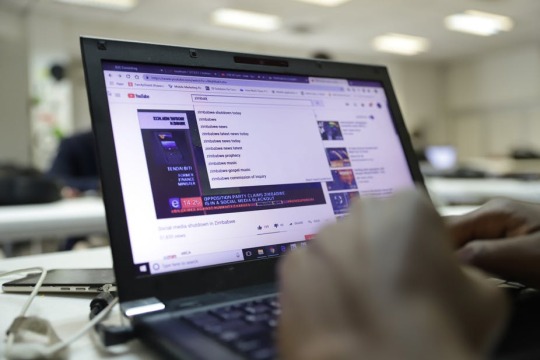
African politicians are quick to realise and leverage the advantages presented by MOOC edtech. 19 sub-Saharan African countries have signed up with AVU to establish e-learning as their long-term strategy for educational development.
In addition to governmental initiatives, there are commercial companies filling up the gap. Initiatives like the African Leadership University (ALU) program aim to establish a network of universities to teach leadership skills to as many African students as possible.
The Future of E-Learning in Africa

African governments are working with various developed countries and NGOs to establish a school networks through the Internet all over sub-Saharan Africa. The new technology-driven policies we’re seeing in African countries are behind this venture.
However, along with the policies, Africa needs a streamlined process to ensure proper technical maintenance of m-learning networks. Also, content development and instructional processes for mobile learning edtech need to be consistent. Africa has to put in a lot of effort to make e-learning accessible to all while sustaining and maintaining indigenous capacities.
Author bio:
Jens Ischebeck is an Africa focused website publisher. The main sites are apps-for-money-transfer.com and Bitcoin-Guide-Africa.com (both cover the international money transfer tools for inward and outward remittances) and distance-education-guide-africa.com (online studying and e-learning).
1 note
·
View note
Text
Flutterwave: A Runaway Payments Solutions Success Story - Connecting Africa to the Global Economy

Before 2016, African businesses faced hard times to accept payments from visitors, and international tech heavyweights like Amazon, Google, Facebook, etc had difficulties to accept local payments from African customers. This has changed since Flutterwave entered the scene. It was founded in 2016 by a team of ex-bankers, entrepreneurs and engineers in response to this gap in the payments industry in Africa.
As a payment technology company, the main focus of Flutterwave is on helping banks and businesses provide seamless and secure payment experiences for their customers. The headquarters is in San Francisco (to leverage on Silicon Valley ) with offices in Lagos, Nairobi, Accra, and Johannesburg.
Achievements
According to the company’s website, Flutterwave currently has more than 50 bank partners, with over $2.6b payments processed in more than 100m transactions. More than 1200 developers build on Flutterwave. This is remarkable by all standards, especially for an African company.
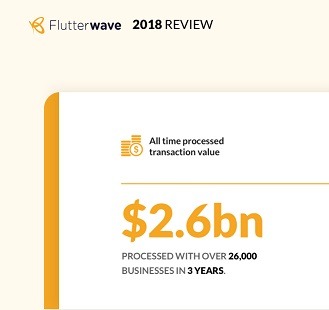
One of the co-founders, 28-year-old Nigerian entrepreneur, Iyinoluwa Aboyeji, who also co-founded Andela, served as the pioneer CEO. He was reported by CNN, as saying that he “wants Silicon Valley to fund a future where Africa is included”, and people and businesses connect with the global economy. As at the time Aboyeji stepped down as CEO last year, and handed over to his co-founder, Olugbenga Agboola, Flutterwave has completed its Series A Extension round of financing, and this has taken its total raised funding from inception to date to more than US$20 million. This shows investors’ confidence in the performance of the company.
In their 2018 review, Flutterwave announced that they saw a 550% growth in the customer base of Flutterwave for Business (Rave), which is now 26,000 strong. This was made possible by partnerships with existing customers, retaining their key partnerships within the financial industry, enterprise customers like Uber, Arik Air, Booking.com and Flywire, and as they welcomed new customers like DusuPay (Uganda), BroadPay (Zambia) and PennySmart (Ghana). The revamped Barter (Flutterwave for Customers) now boasts of over 30,000 customers.
Their terrific run of achievements in 2018 culminated in the Best Payments Company award at the Ghana eCommerce Awards ceremony.
Payment Solutions
What makes Flutterwave thick? With its payment technology solution, consumers can pay for things in their local currency, while the company takes care of integrating banks and payment-service providers into its platform and this relieves businesses of the expense and burden.
The company’s award-winning payments infrastructure which is accessible via USSD, Mobile, Point of Sale and Web channels enables banks, payments companies, and businesses to do much more. The numbers from the 2018 review by the company attest to the massive adoption of these infrastructures by merchants and customers. There is no sign that the upward growth experienced by the company will abet anytime soon.

The payment solutions are listed below.
● Rave (Flutterwave for Business) – an easy way to accept any payment method from customers and make payments, around the world online or in-store. With many positive testimonies from notable local businesses in Nigeria and beyond, signing up for rave opens up businesses to more opportunities by letting them accept a range of payment methods (card, bank account, and mobile wallet payments) from customers around the world, in person in physical stores or through app/website or on social media.
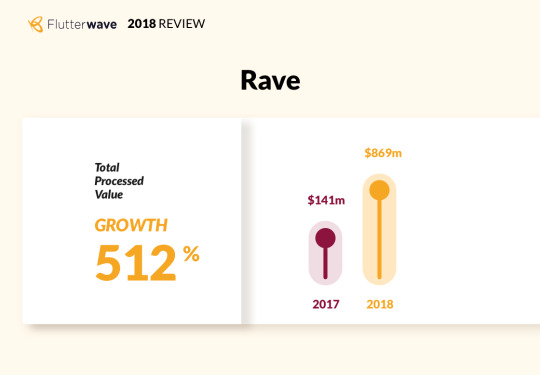
● Moneywave – used to make payments to anyone around the world. It is a payment system that allows users to securely charge cards and pays accounts. It is basically an API suite that allows connection of disparate payment sources, an omnichannel platform for payments across Africa.
● Barter (Flutterwave for Consumers) – used to issue and manage virtual and physical cards for retail, loyalty and expense management.
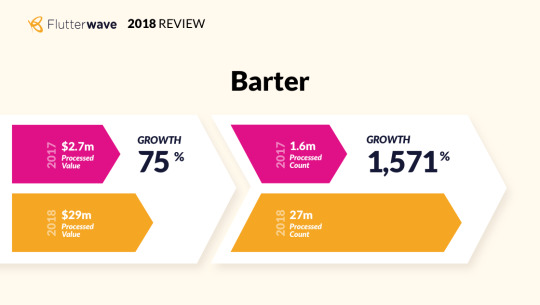
Partnerships
To accelerate its activities in its area of focus, Flutterwave has gone into various partnerships. The following partnerships are meant to address the listed issues:
1. Flywire + Flutterwave – this solution integration aims to streamline payment transactions for Nigerian students, patients, and businesses to facilitate payment of foreign school fees and medical bills in Naira.
2. Shopify + Flutterwave – this integration makes selling online easier. It helps African businesses scale globally by integrating Rave into their Shopify store.
3. Alipay + Flutterwave - this gives all Flutterwave merchants access to over 1 billion Alipay users, capturing payments activity around the estimated $200 billion in China-Africa trade. Alipay is now an additional option, to card, Barter, Mobile Money and other payment channels on the Rave checkout modal.
4. PayAttitude + Flutterwave – this only requires a customer’s phone number for a successful payment to occur, though the customer needs to be PayAttitude customer or get it first to be able to use this payment method.
5. Flutterwave + Afropolitan Group – this partnership is aimed at bridging the gap between Africa & the diaspora through entertainment & ticketing.
Developers
Flutterwave touts herself as the Google of all things Payment, with a leading community of engineers who develop the next standard of payment technology in the industry. They provide everything needed to build reliable and secure payment experiences. They make their libraries, plugins, and SDKs available so others can easily integrate and start collecting payments in minutes.
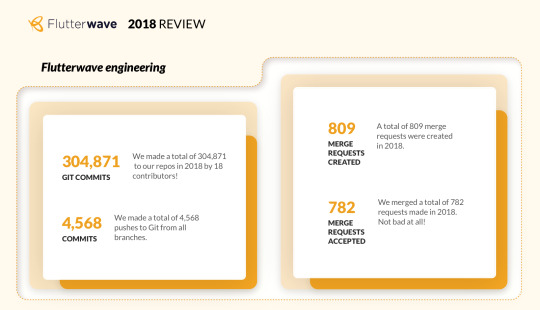
Closing Thoughts
Before this research, I knew very little about Flutterwave. In comparison to others in their space, they are heavyweights in their rights. I’m amazed at their dedication to building payments infrastructure to connect Africa to the global economy, and all that they have achieved in just a few short years. They are truly making it easier for Africans to build global businesses that can make and accept payment, anywhere from across Africa to the global economy. They have converted me and my business into customers for all their products. I am now following the relevant social media handles including that of the past and current CEOs. But more importantly, I am now their unofficial evangelist. You will be sure I will convert many into the Flutterwave way. Who knows, you the reader might just be one of them.
Image credits: Flutterwave Inc
2 notes
·
View notes
Text
Flutterwave: The African Payments Technology Giant

Flutterwave is an African payment technology company founded in 2016 by ex- Andela co-founder Iyin Aboyeji and a team of ex-bankers, entrepreneurs and engineers.

The payments solution company provides uninterrupted and secure payment experiences to banks, businesses and their customers. A merchant can accept local and international payments with their services. Their online payments platform also enables customers to pay for things in their local currency while Flutterwave https//www.flutterwave.com/ takes care of integrating banks payment service providers into its platform so businesses don’t have to take on the expenses and burden.
Businesses that are using flutterwave are Uber, Oja Express, Booking.com, Transferwise, Flywire, etc.
Flutterwave currently has more than 50 bank partners, with over $2.6 billion payments processed in more than 100 million transactions. The company also has more than 60,000 merchants on its platform. The company has more than 1200 developers building for them.
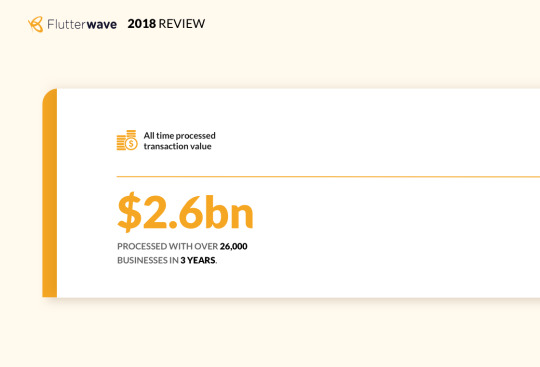
Flutterwave Products
RAVE https://www.ravepay.co/
This is a flutterwave for business product that allows businesses to make and accept payments from customers anywhere in the world. It is a service that enables merchants accept global payments from card, bank accounts and USSD.

BARTER
https://flutterwave.com/online-payments-products/barter/
This is a flutterwave for consumers' product. It’s an app that helps individuals and Small and Medium Enterprises(SMEs) make and receive money from across Africa. The Barter app can also be used for paying TV bills, buying airtime, paying Internet subscription, paying utility bills, buying mobile data subscriptions.
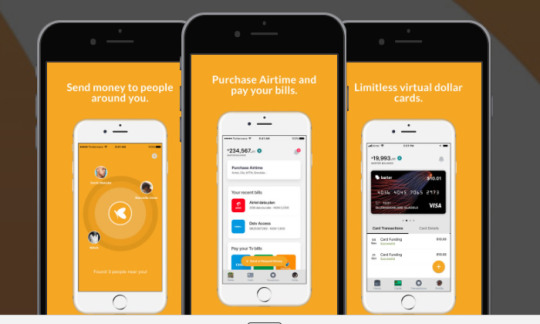
ACHIEVEMENTS
In July 2019, Africa’s integrated payments platform, Flutterwave announced its partnership with Chinese e-commerce company Alipay to offer digital payments between Africa and China in order to boost the Africa-China trade.
Earlier this year, Flutterwave in conjunction with Visa also launched a product for Africa called GetBarter. This is aimed at facilitating personal and small merchant payments within and across Africa’s national borders.
The company in October 2018 completed the Series A extension round of financing with investments from notably Mastercard. This took the total funding the company raised above the $20 million mark.
The company also received the former chairman and CEO of Visa, Joe Saunders to its board of directors despite the setback of its co-founder, Iyin Aboyeji leaving in October 2018.
Flutterwave is now also licensed in the United Kingdom and Zambia for payment processing and electronic remittances.
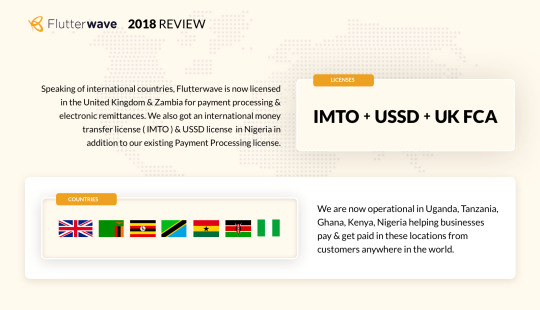
Advantages of Using Flutterwave
1. Flutterwave is ISO 27001 certified meaning the company has internationally acceptable business practices and processes.
2. The company is diving into the global market with partnership with US and Chinese companies.
3. Rave by flutterwave support payment in US dollar, Euro, British pound and many other currencies.
4. Zero set-up fees for integration by businesses.
5. Has partnership with companies like Mastercard, Visa, Uber, Booking.com, hence very reliable.
6. Rave is a Secure and efficient payment platform by being PADSS certified.
Disadvantages of Flutterwave
1. Poor customer care service.
2. No POS machines for offline transactions for Small and Medium Scale Enterprises (SMEs).
Impact of Financial Technology in driving economic growth in Africa
There is no universal payment method in Africa and only 3% of African’s reportedly own a credit card. This means that African businesses have a hard time accepting payments from Africa.
According to former Flutterwave CEO, Iyin Aboyeji, “Fintech is a fundamental piece to driving the real value of digital economy and the payments solution giant, flutterwave is trying to connect Africa to the digital economy”. Therefore, the importance of financial inclusion cannot be overemphasized. The increased access to financial services has opened new doors to individuals and families, allowing them to smooth out consumption and invest in their futures.
No tech sector has the potential to impact Africans at the bottom of the pyramid as fintech does. By addressing the issues of financial exclusion, fintech companies can equip more people to become financially savvy. It is, therefore, no surprise that fin-tech companies attracted the lion’s share of tech investment on the continent with 50% of total funding in 2018. Fintech has the potential to increase economic growth in Africa by improving capital allocation and increasing efficiency.
Flutterwave, the leading Payments platform in Africa, through the products they provide is championing the cause of leading Africa into the digital economy by providing opportunities for businesses to expand their client base while also gaining access to data that can be used to predict consumer behaviours, spending patterns and emerging trends in financial technology.
1 note
·
View note
Text
The Complete Payment Solution you need to thrive in the Global Economy
Flutterwave is a trusted online payment gateway in Nigeria focused on providing individuals and businesses with seamless, intelligent and secure online payment solutions.
Founded in San Fransisco in 2016 with an office in Lagos, Flutterwave now has an operational presence in Nigeria, Uganda, South Africa, Tanzania, Ghana, and Kenya. In 2018, Flutterwave announced its entry into the United Kingdom and Zambia after obtaining licenses for payment processing and electronic remittances.
Flutterwave boasts of thousands of merchants all over the world with over 100 million transactions worth billions of dollars since inception. Through partnerships with international brands like PayPal, Transferwise, Alipay, Shopify, and VISA, Flutterwave strives to connect its customers with the global economy with ease.
In 2018, Flutterwave got ISO 27001 certification which means Flutterwave has internationally acceptable practices and processes including a robust business continuity plan.
It is worth mentioning that Flutterwave is continuously using technology to shape Africa’s digital economy. In recognition of providing efficient business payment solutions across Africa, Flutterwave received the ‘Best Payments Company’ at the 2018 Ghana eCommerce Award ceremony.
Flutterwave products like Rave, Barter, and Moneywave are modern online payment platforms tailored to drive financial inclusion in the global economy. Whether you are thinking of how to manage your personal finances or looking for the right technology to build and grow your business globally, Flutterwave has a payment solution for you.
Rave by Flutterwave
Rave is unarguably the easiest way for merchants to make and receive payments from anywhere in the world. Rave is used by giant companies like Uber, Booking.com, Flywire, Jumia, Arikair, OjaExpress and several small and medium businesses across Africa. Currently accepting over 150 currencies from over 26,000 merchants, Rave is the ideal merchants' marketplace.
Ravepay offers merchants a fully integrated end-to-end payment gateway with no additional operational cost required and the best technology to achieve zero failed transactions.
Merchants can easily get started on Ravepay with no setup or monthly fees and have control over the acceptance, settlement and transaction analysis process. A reasonable fee is charged per transaction through multiple payment collection channels like;
- In-person through sales mode and the Rave dashboard
- App or Website by installing Rave plugins that allow integration with e-commerce platforms like Alipay, Shopify, Magento, and Woocommerce; SDKs and libraries for customized Apps and websites
- Social media using Rave instant payment links from Instagram or Facebook feeds.
Rave merchants can receive money from customers through:
Credit or Debit cards like Visa, Mastercard, and Verve.
Bank Account Payments from the U.S., Nigeria, and South Africa.
Mobile Wallet Payments on MTN, M-Cash, M-Pesa, and TIGO
How to start and grow your business with Rave
1. Develop a business idea- Identify a need or find a solution to a problem.
2. Conduct a market survey- study your potential customers and how best to serve them, look around for competitors and learn from them.
3. Create a business plan - Set measurable goals and how you intend to achieve them.
4. Raise enough capital
5. Register your business for easy identification
6. Start your business online, in-store or even both.
7. Visit Rave by Flutterwave to create a free Rave account and select a payment feature that meets your needs in less than 5 minutes.
8. Display prices and accept local or global payments in your customer’s preferred currency.
9. Receive payments in your app or website, on social media or in-person through debit or credit cards, bank accounts, and mobile wallets payment in any currency.
10. Manage your funds, expand and pay vendors globally to grow your business.
Already have a business and you want to grow it? Switch to Rave by Flutterwave, accept payment from multiple channels and give your customers the best possible payment experience.
Pros
Cost-effective, all in One Dashboard.
Accept payment from all channels where your business thrives.
Enjoy well managed 24/7 customer support from Flutterwave for even bigger solutions.
Cons
Rave account verification after creating an account might take time so the earlier the better you create a Rave account while deciding to start your business.
Barter
Need a better (financial) half? Get Barter App. Barter by Flutterwave is a payment platform that allows you to manage your personal finances better.
Whether you are sending money to friends, buying airtime, paying utility bills, internet subscription or saving for your next big project, use Barter.
With Barter, you can add your personal bank account to your app dashboard and monitor your funds in your local currency.
Sign up for Barter on the website or download the GetBarter App to join over 30,000 people already using Barter to make their lives better.
Pros
Easy and efficient way to monitor your spendings.
Allows funding through card or bank accounts and bank transfers.
Access to easily repayable short-term loans.
Cons
Allows local currency transactions only.
- Editing of profile and other personal details used in signing up may take time so be careful when signing up.
Moneywave
Moneywave is an omnichannel payment solution that allows you to build customizable money transfer platforms, online banking, mobile banking, and Artificial Intelligent solutions.
Similar to Rave, Moneywave allows you to send money from
- VISA to bank accounts on Mobile
- Bank accounts to VISA on Mobile
- Verve to Discover on ATM
- Discover to Verve on Chat boxes
- Mastercard to Mastercard on Web
- AMEX to AMEX on different bank channels
Sign up for Moneywave to get started.
Flutterwave Developers
Flutterwave is currently home to thousands of developers who have over the years built APIs with easy to use plugins, SDKs, and libraries for the integration of customized payment solutions. Interestingly Flutterwave developer community also offers other developers a playground with the aim of continuously improving the standard of payment technology in the Fintech industry.
The future is all bright for Flutterwave as Olugbenga GB Agboola, the CEO at the beginning of the year reinstated their commitment as a customer-focused brand striving to give their customers the best possible checkout experiences at all times.
#flutterwave#payment solutions#rave#ravebyflutterwave#barter#getbarter#payment gateway#ecommerce#mobile money#moneywave#barterbyflutterwave#flywire#alipay#moneytransfer#personal finance#merchantmarketplace#global economy#how to start a business#how to grow business#online payment#flutterwavenigeria#nigeriaonlinepayment#nigeriafintech#safe online payments#bank to bank transfer#bill payments#payment integration for websites#flutterwavedevelopers#ravesignup#raveaccount
1 note
·
View note
Link
0 notes
Text
Looking for the Best E-commerce Website Development Company in Zambia? Look no further!
Voxforem is your trusted partner for all your e-commerce needs. We specialize in custom web design, mobile apps, and software development, making us the top choice for businesses in Zambia. With our expertise, you can take your e-commerce venture to new heights.
Why Voxforem for E-commerce in Zambia?
Custom E-commerce Design: Our team of experts creates modern and engaging e-commerce websites tailored to your objectives and goals. We'll enhance your online presence with attractive and user-friendly designs.
Multi-Channel E-commerce: Manage your e-commerce business seamlessly across different channels and locations. We offer solutions for effective administrative, financial, and overall business activities, along with automated reporting.
Secure Payment Methods: We understand that customers have diverse payment preferences. Voxforem ensures you can accept payments through various methods, including Stripe Connect, credit/debit cards, Pay at Store, COD, and digital wallets.
Booking Platforms: If your business involves booking and ticketing, we've got you covered. Our customized solutions make the process easier and more transparent for customers worldwide, with a strong focus on payment protection and efficiency.
Responsive and Mobile-Friendly: Our e-commerce services are designed to work seamlessly on mobile, tablet, and desktop devices, ensuring that you can reach customers across all platforms. When it comes to e-commerce website development in Zambia, Voxforem stands out as the premier choice. Contact us today for innovative e-commerce solutions that will drive your success in Zambia and beyond.
0 notes
Text
Business Development Executive at Findura Infosys Limited
Business Development Executive at Findura Infosys Limited
Findura Infosys Limited
Findura Infosys Limited is a Zambia ICT services company that specialises in the development of Mobile and Web Apps, Microsoft solutions delivery and ICT support. The company is looking for an Business Development Executive to join its Sales Team.
Reporting to the Director Strategy and Business Development, the Business Development Executive is an ambitious, energetic and…
View On WordPress
0 notes
Text
Top Mobile App Development Trends that Will Rule in 2019
Hence until another year is on the edge of achievement, and we are on the origin of embracing 2019. You strength say that there is no important change in your life but we cannot consider the same account for the mobile application development companies, industry, and technology. The mobile applications and devices have gone through a constant evolution where one saw the arrival of new trends and development of the current ones.
However, the mobile app developers and device supporters are excited to know what’s the update from the export front. What are the innovative technologies that will set a record in the future year?
Yes, it’s true that we all have heard about the IoT developments, the iBeacon technology, Machine Learning, Increased Presence, and Practical The reality, and others, etc. but we need to learn what further developments and modifications occur in the preceding advanced methods.
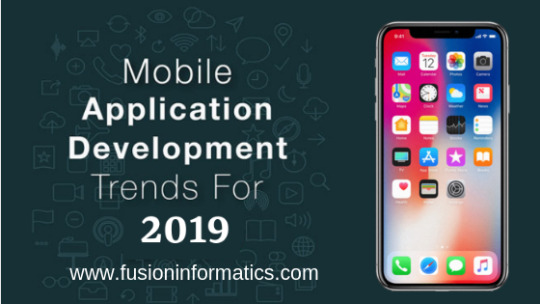
Mobile App Development Trends to Follow Out For in 2019:
1. Internet of Things to Gain More Ground:
Internet of Things or IoT has previously created much the buzz around the division and will advance to take defender further up. It has raised a different group of industry verticals including healthcare, e-commerce, production, and transportation, etc. and it will enhance the ecosystem with its perception in the direct industry, real estate, and development of intelligent cities. The experts suspect IoT to solve the threat of traffic noises and the problem of vehicle parking.
Healthcare is another division that has hugely benefited from IoT. We saw the emergence of Medical Internet of Things which immensely helped both doctors and the victims. In fact, doctors can get more specific data about the energy condition and prescribe the procedure precisely.
2)AR and VR: the Hyped Technologies:
A new phrase has been issued for the AR and VR technology ‘Beyond the Screen’, which has really created a huge impact on the audience in recent years. The futuristic AR and VR technology is not only refining and growing the successful advanced gaming apps but have also created a hype around the social media platforms.
AR is the best tool that you can use for a social media attack. The social media platforms have delivered integrated AR filters that can turn any human face into digital character.
3. Chatbots to Gain Significance:
Today chatbots have become an essential part of most of the on-demand apps, which enables you to react immediately in real-time to your consumers. They are practical accessories and does not involve human-to-human communication.
4. Growth of Machine Learning and Artificial Intelligence:
The term Artificial Intelligence and Machine Learning development aren’t alien to tech enthusiasts anymore. In fact, the AI has been victorious in creating a huge impact on simplifying the services and the demand process. When it gets co-operated with machine learning, it can do wonders to any business in making valuable data and real-time analytics.
5. The Roll-out of Instant Apps:
As such the immediate best mobile apps development in Morocco came into being in 2016 and within the span of these two years, they have gone frequently popular. These are the native portable apps that you don’t need to download. And to tell you also, they are user-friendly, accessible including having a miniature size.
The key causes why they are becoming also popular is that you don’t need to connect them which will present your phone memory free. Still, you can share it with your friends.
6. Influence of Wearable Apps:
As people are moving towards popular technologies, we are witnessing innovative ideas growing executed. The instance of wearable apps can be put progressive with that view.
Conclusion:
The mobile applications have certainly become a necessary part of people’s lives and it’s hard to believe a day without any statement. Today, we are making most of our crucial exercises using apps such as shopping, ordering food, booking tickets, cab and meal, banking and even checking out the important health parameters.
The developers need to keep a perpetual eye on what’s arriving in the app business and statements made by Apple or Google to perform those changes for giving optimum user activity.
The app development has enormous benefits and few we have discussed above, but many have yet left. Overall the mobile app development assistance is the beginning of a new period and lifestyle. If you are more impressed I suggested Fusion Informatics. It is one of the most preferred mobiles App Development Company in South Africa. For more queries please send a mail to get a free quote [email protected].
For more details visit:
App Development Companies in Madagascar
App Development Companies in Zambia
Mobile Apps Development Companies in Tanzania
Mobile Apps Development Company in Ghana
#Android App Development in Ethiopia#App Development Company in Ethiopia#Mobile App Development Company in Uganda#App Development Company in Ghana#Android Application Development Companies in Ghana#App Development Company in Tanzania#Android App Development Company in Tanzania#Apps Development Company in Nigeria#Best Android App Development Companies in Nigeria#Mobile App Development Company in Zambia#Best Android App Development Companies Zambia#Apps Development Company in Madagascar#Mobile Apps Development Company in Morocco
0 notes
Text
School Management Software Zambia | Cybrain Software Solutions Zambia Limited
Simple, Powerful & Affordable School Management System with Mobile App.

Cyber School Manager is India's first school management software with mobile app. Cyber School Manager ensures smooth functioning of the day-to-day school operations whereas CSM Mobile App enables parent-school interaction in an instant manner bridging all the possible communication gaps. The software is hosted on Google App Engine ensuring scalability and robustness.

NEED HELP?
CALL US :+260966834868

Contact Us
Registered Place: Bytes Park Plot 21914/M, Ngwerere Road, Lusaka.
Mobile : +260966834868
Email : [email protected]
Website : www.cybrain.co.zm
follow us on facebook:https://www.facebook.com/CybrainZambia/
follow us on Instagram:https://www.instagram.com/cybrainsoftwarezambia/
follow us on Linkedin:https://www.linkedin.com/company/cybrain-software-solutions/
#Digital Marketing Company Zambia#Web Development Company Zambia#Mobile Apps Development Company#software development company Zambia#Web Design Company Zambia#digital marketing services in Zambia#online school software in Zambia#School management software Zambia#mobile app development services Zambia#club management software Zambia#healthcare software companies Zambia#Best School management App Zambia#Biometric Attendance software Zambia#SMS Management Software Zambia#SEO Company in Zambia
0 notes
Text

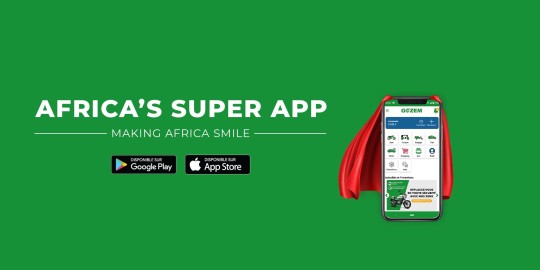

Can a motorcycle-hailing company create an African super app?
By Stephanie Bailey, CNN Business
Gozem started out as a ride-hailing service in Togo, West Africa. (CNN Business)Super apps have taken off in Asia, with users able to book flights, reserve hotels, play games and more all in one place.
But they've yet to make their mark in Africa. One company hoping to change that is Gozem.
Launched in 2018 in Togo, West Africa, it started by offering a motorcycle-hailing app, but has since added services such as food and grocery delivery, vehicle financing and a digital wallet, while expanding to Benin and Gabon.
Based in Singapore, the startup was cofounded by a Nigerian and two Swiss entrepreneurs who saw an untapped market in West Africa. Gozem says its app has been downloaded 800,000 times and as a ride-hailing service it has completed four million trips with its 2,500 drivers. Its aim now is to make the app indispensable.
"What do we all do? You commute, you use transportation, you need to eat every day, you need to make payments. So, it's all those key verticals that we all use in our daily life that we put in one app," says Raphael Dana, Gozem's cofounder.
Gozem isn't the only company with ambitions of building an African super app. Nigeria's Gokada, which also started as a ride-hailing service, is making similar efforts, as is South African communications company Vodacom (VDMCY), which is partnering with China's Alipay.
How African trucking firms are trying to make everything cheaper
How African trucking firms are trying to make everything cheaper
But Gozem is focusing on French-speaking Africa. Dana says developing a super app only makes sense in emerging markets because there is less competition for each service.
"In a developed market, it's impossible to propose something that can do everything in all verticals and all the sectors. In Europe, in the US, there are too many players," he says. "Because the (African) Francophone market is completely untapped, we can look at building a strong tech company, building data and solving real problems."
Gozem says that as a ride-hailing service it has completed four million trips.
Gozem says that as a ride-hailing service it has completed four million trips.
Dana says Gozem was inspired by two Asian super apps — Singapore's ride-hailing platform Grab and Indonesia's ride-hailing and delivery service Gojek.
"We believe that Southeast Asia is the best role model to look at when you want to build a startup in Africa," says Dana. "You are going to find a lot of similarities in the problems the populations are facing."
Can Africa be next?
According to consulting firm McKinsey & Company, super apps are expected to generate $500 billion in revenues by 2025, with growth in Asia and emerging markets like Brazil.
Anindya Ghose, professor of business at NYU and author of "Tap: Unlocking the Mobile Economy," points out that Africa has a growing number of smartphone owners, as well as startups looking to diversify their app offerings.
However, Ghose says a lack of access to high-speed internet could be a barrier to the uptake of super apps, and that monetizing them may be a challenge. Gozem says it will make money through commissions from its vehicle financing, rides and deliveries, as well as transaction fees on payments.
There aren't many true Pan Africanists in the same class as the Zimbabwean British billionaire, Strive Masiyiwa; he has had businesses in Zimbabwe, South Africa, Kenya, Zambia, and Nigeria. He has the expertise, or technical know how and well connected with both the western and eastern worlds to create a greater impact since his recent partnership with Facebook to connect Central Africa with high speed internet may just be the start on to much greater connectivity of the continental Africa. He has already developed great apps such as SasaiPay and SasaiRemit, and SasaiWatch. Aliko Dangote is another blessing to the African people; he is an industrialist fully content on creating jobs through proliferation of factories, starting in Nigeria all the way to Malawi. Ndubuisi Ekekwe is a first class business professor who has the vision to bring on par the future African generations of entrepreneurs with the rest of the world.
Source: CNN
0 notes